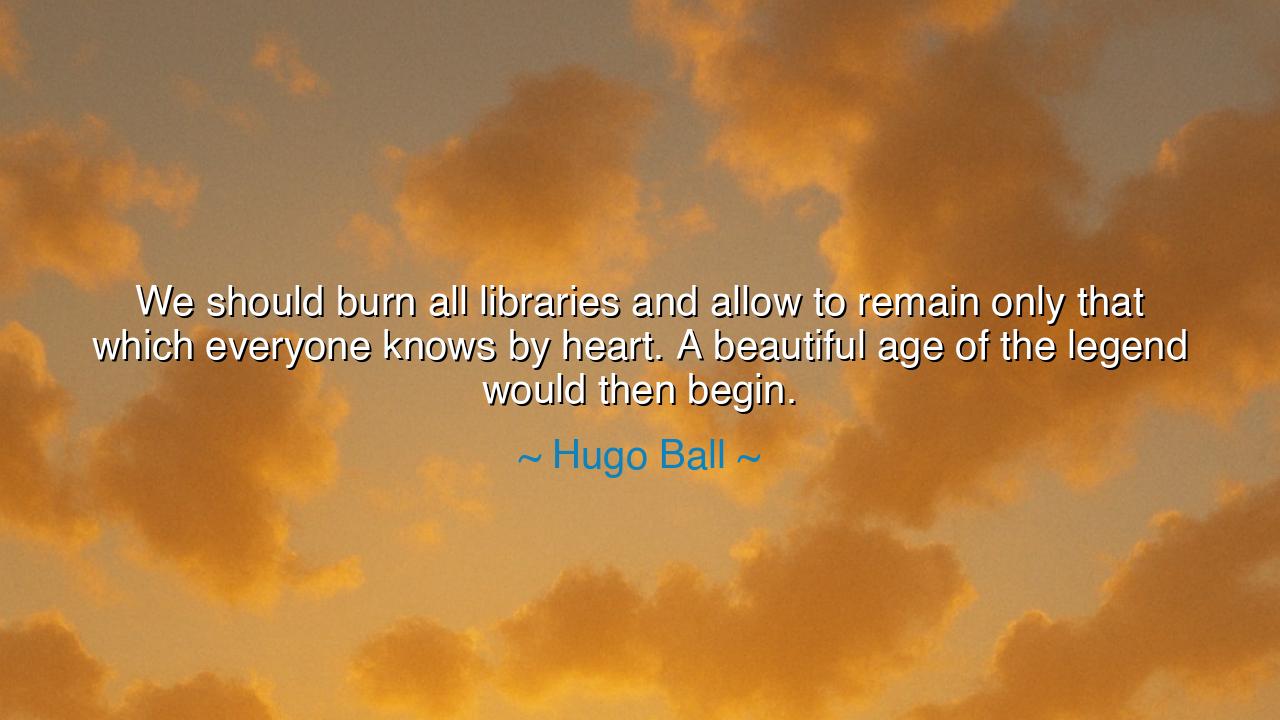
We should burn all libraries and allow to remain only that which
We should burn all libraries and allow to remain only that which everyone knows by heart. A beautiful age of the legend would then begin.






In the vast expanse of human history, the written word has served as the repository of knowledge, a sacred archive that preserves the wisdom of ages past. Yet, in a world where libraries are filled with countless tomes, some might question whether our knowledge has become too fragmented, too scattered, and too distant from the truths we once held close. Hugo Ball, in his provocative statement, "We should burn all libraries and allow to remain only that which everyone knows by heart. A beautiful age of the legend would then begin," suggests a radical vision: one where the power of the oral tradition and the purity of shared wisdom take precedence over the written word.
At first glance, this may seem a call for destruction, a challenge to the very foundations of learning and progress. Yet, beneath these words lies a powerful truth—one that calls us to return to the roots of humanity. In the ancient world, before the advent of books and scrolls, knowledge was passed down from generation to generation through storytelling, through memory, and through the spoken word. The epic tales of the Greeks, the Vedas of the Indians, and the sagas of the Norse were all shared not in ink on paper, but in the hearts of the people. These legends were not merely stories; they were living wisdom, carried within the minds of the people who told them. To know a story by heart was to possess its truth, to carry its lessons in the very core of one's being.
Consider the Homeric epics of The Iliad and The Odyssey—tales that were sung by bards for centuries before they were ever committed to paper. These stories were not merely words on a page; they were the essence of Greek culture, the embodiment of valor, honor, and sacrifice. The legend of Achilles and the journey of Odysseus were not just to be read; they were to be lived, felt, and passed down from one generation to the next, etched into the minds of the people. The act of learning was not merely a mechanical process of reading and memorizing but a living, breathing connection to the soul of the people.
In a similar vein, consider the oral traditions of the Indigenous peoples of the Americas, Africa, and Australia. In these cultures, knowledge, history, and wisdom were not confined to libraries but were passed down through songs, rituals, and storytelling. The stories carried the essence of the people's identity, their relationship with the land, and their understanding of the world. By committing these stories to memory, each generation ensured that the wisdom of the ancestors lived on—not as something distant and impersonal, but as something immediate and relevant. In this way, the legendary age that Hugo Ball envisions is not one of destruction, but one of reconnection—a return to the living traditions of humanity, where knowledge is not a thing to be studied in isolation, but something to be embodied.
Yet, in the modern world, we have grown accustomed to the written word as the ultimate authority. Libraries, universities, and textbooks have become the sanctuaries of knowledge, while the power of the oral tradition has diminished. In this era, we often turn to books not to live the knowledge they contain, but to consume it. The words are no longer felt in our bones, but merely understood in our minds. What would happen if we were to return to a time when the living memory of the people was the source of all wisdom? When the stories we tell each other are not abstract concepts in a book, but truths we have internalized and made our own?
The lesson of Hugo Ball's quote, then, is not one of nihilism or destruction, but one of renewal. It is a call to remember the importance of shared experience, of living wisdom, and of the deep connection that exists between the individual and the collective. Libraries may preserve knowledge, but they are not the source of life; the human spirit is. In a world where information is often detached from emotion, where knowledge is fragmented and forgotten, Ball's vision reminds us that the true power of learning lies not in the accumulation of facts, but in the living transmission of wisdom from one generation to the next.
Thus, let us take this wisdom and live it. Let us commit to internalizing the stories that shape us, not merely reading them, but allowing them to become a part of us. Let us pass on the knowledge we hold, not as facts to be memorized, but as truths to be felt and embodied. A beautiful age of the legend, as Hugo Ball imagines, can only begin when we see knowledge not as a commodity to be stored and catalogued, but as a living flame, carried in the hearts of those who truly understand it. Let us reclaim the power of the legend, not as an artifact of the past, but as a guiding force for our future.






AAdministratorAdministrator
Welcome, honored guests. Please leave a comment, we will respond soon